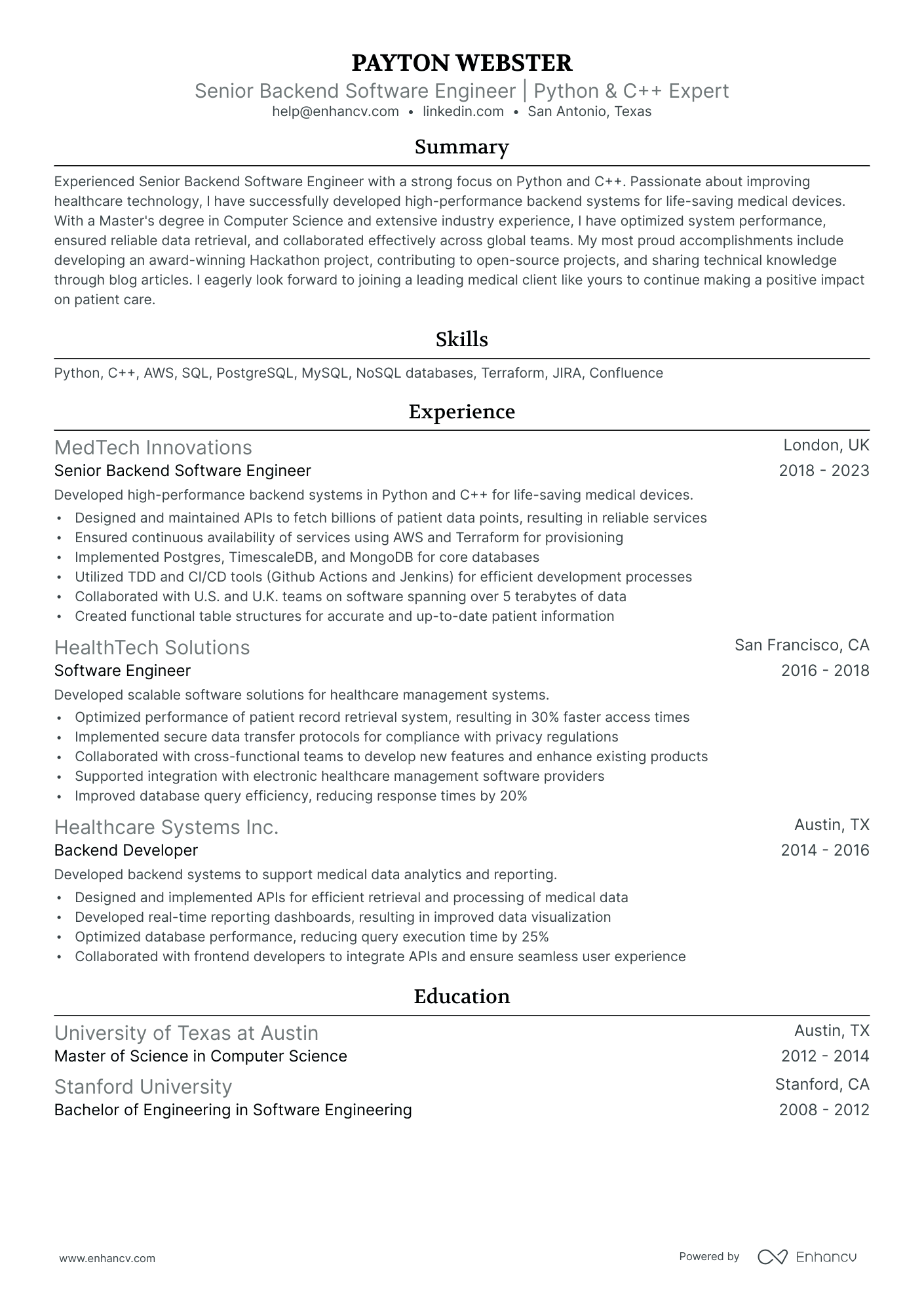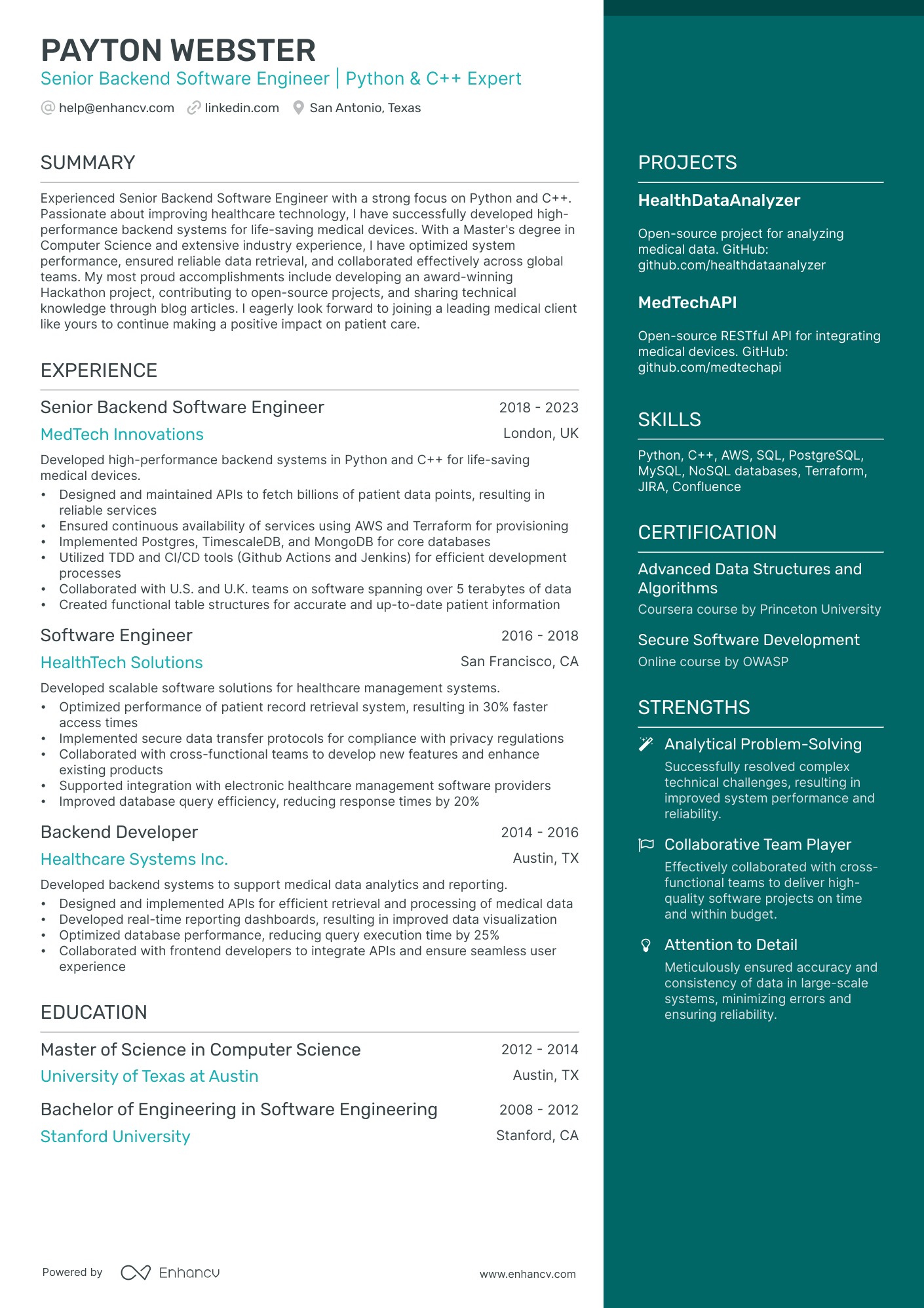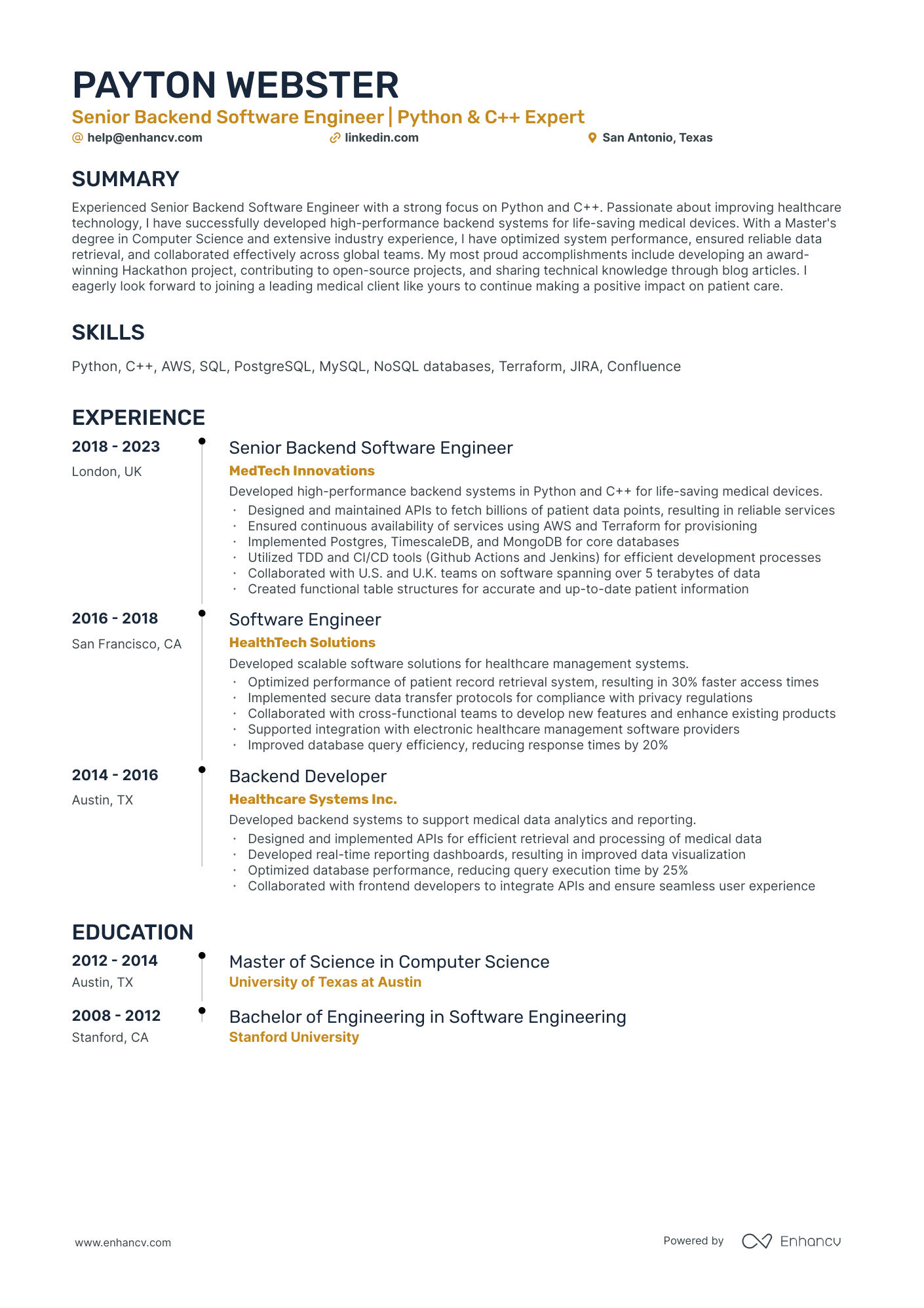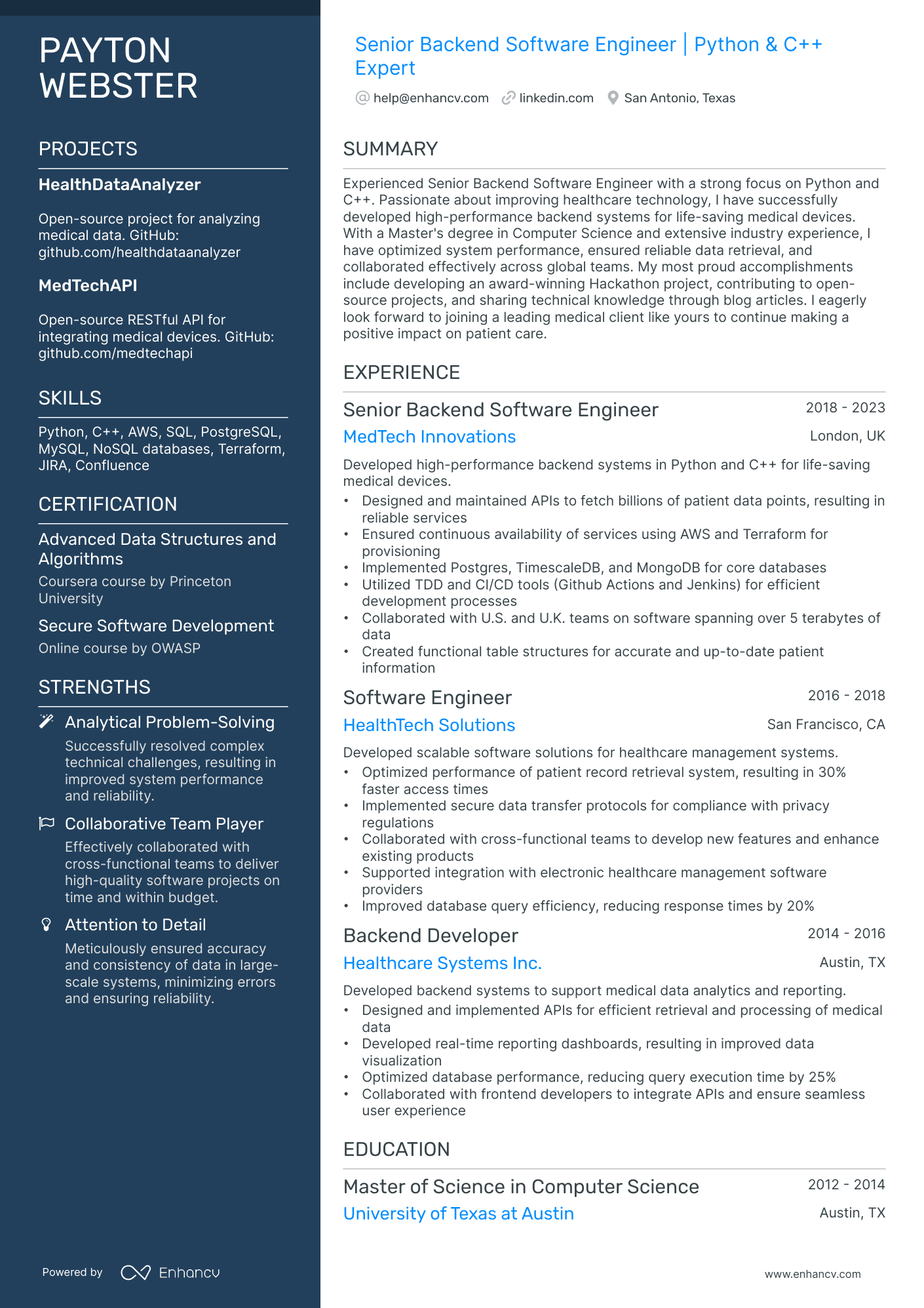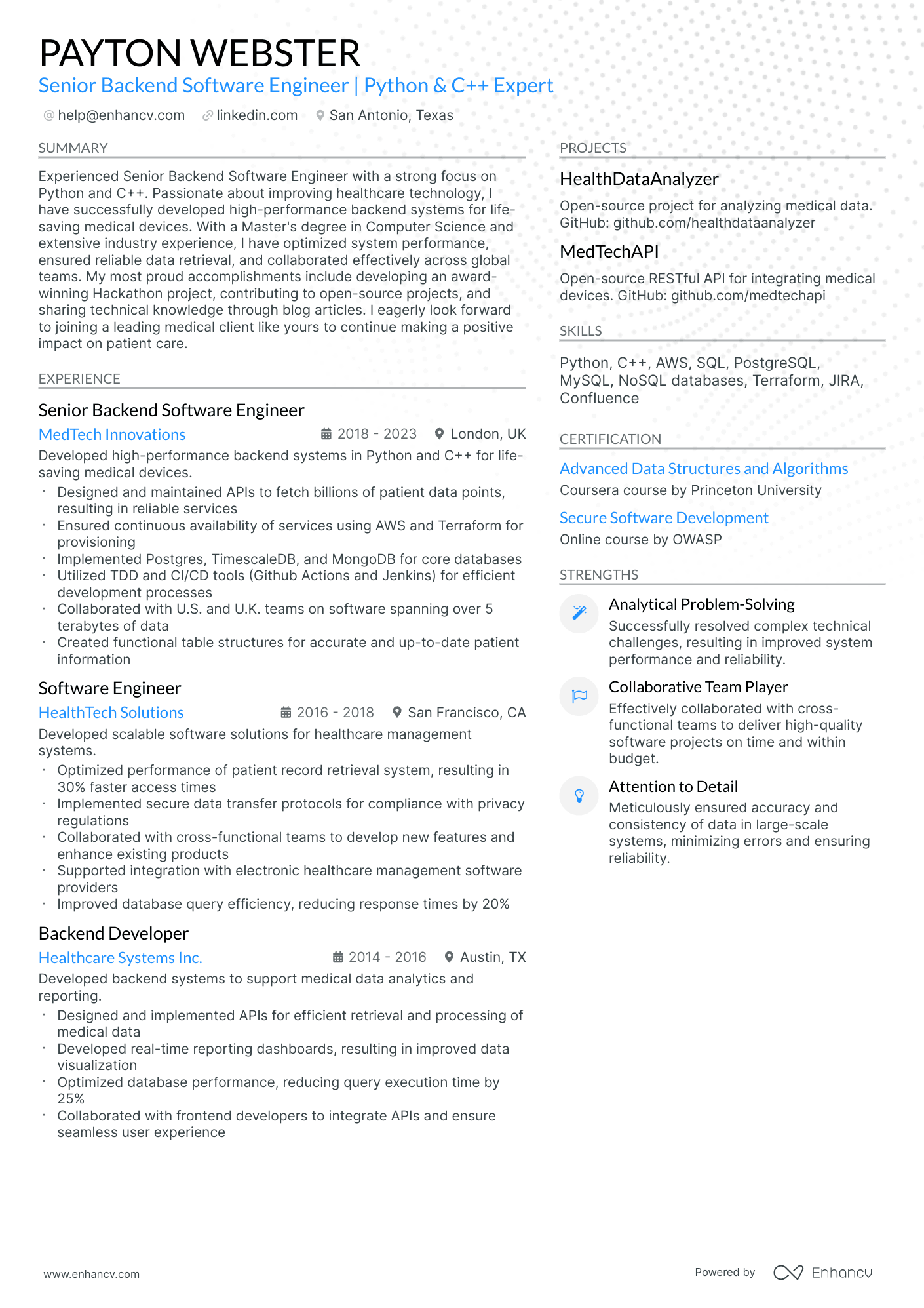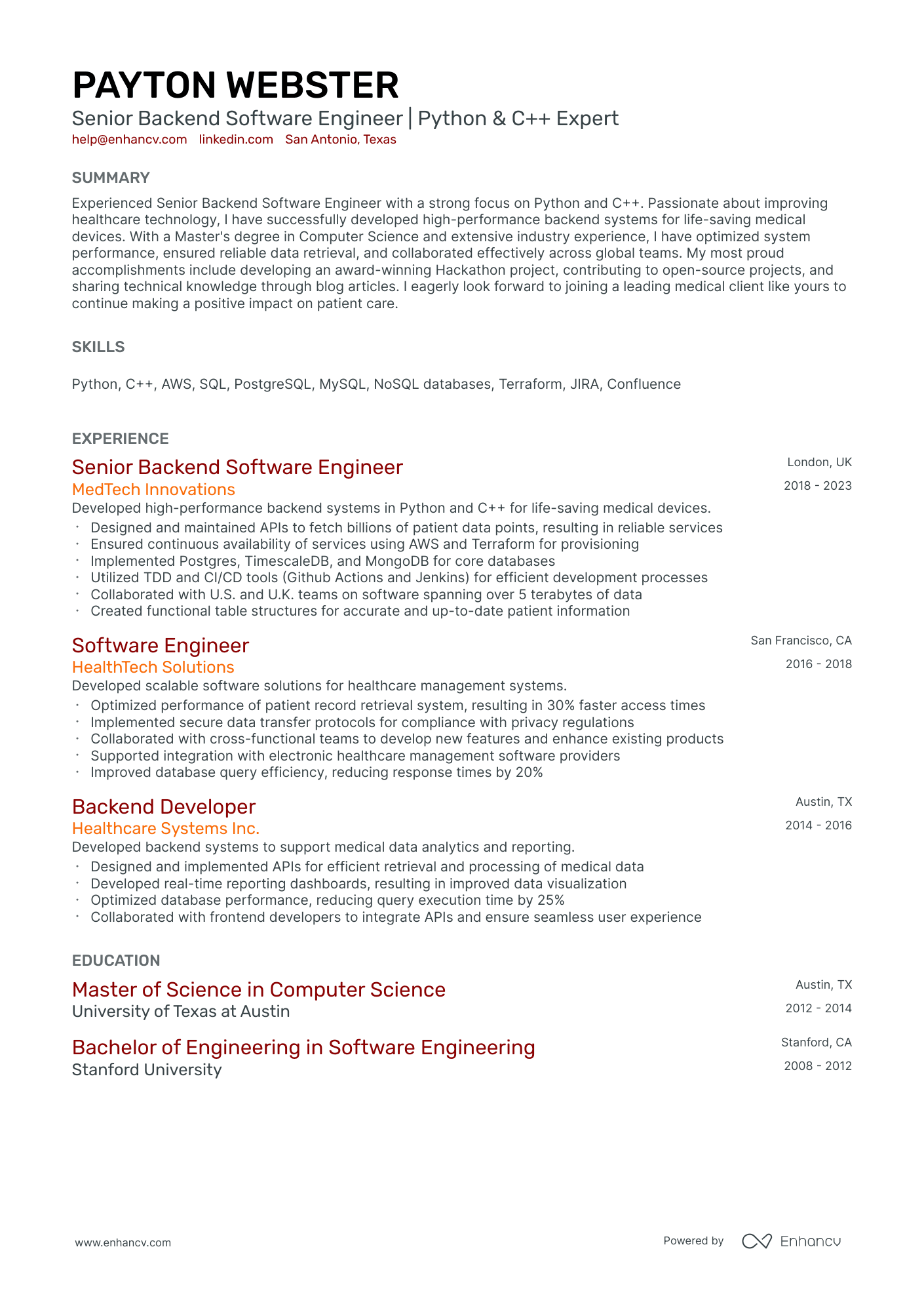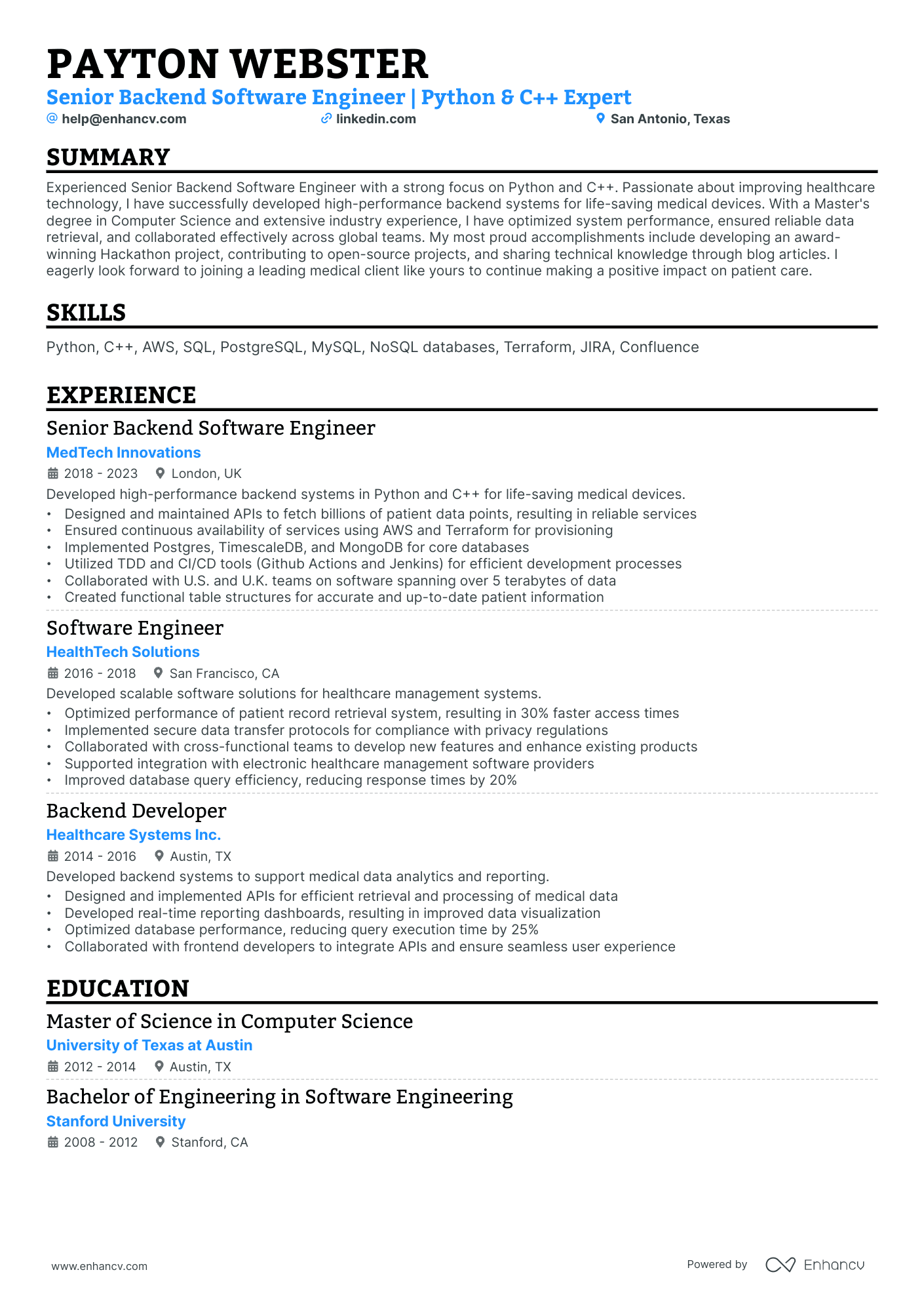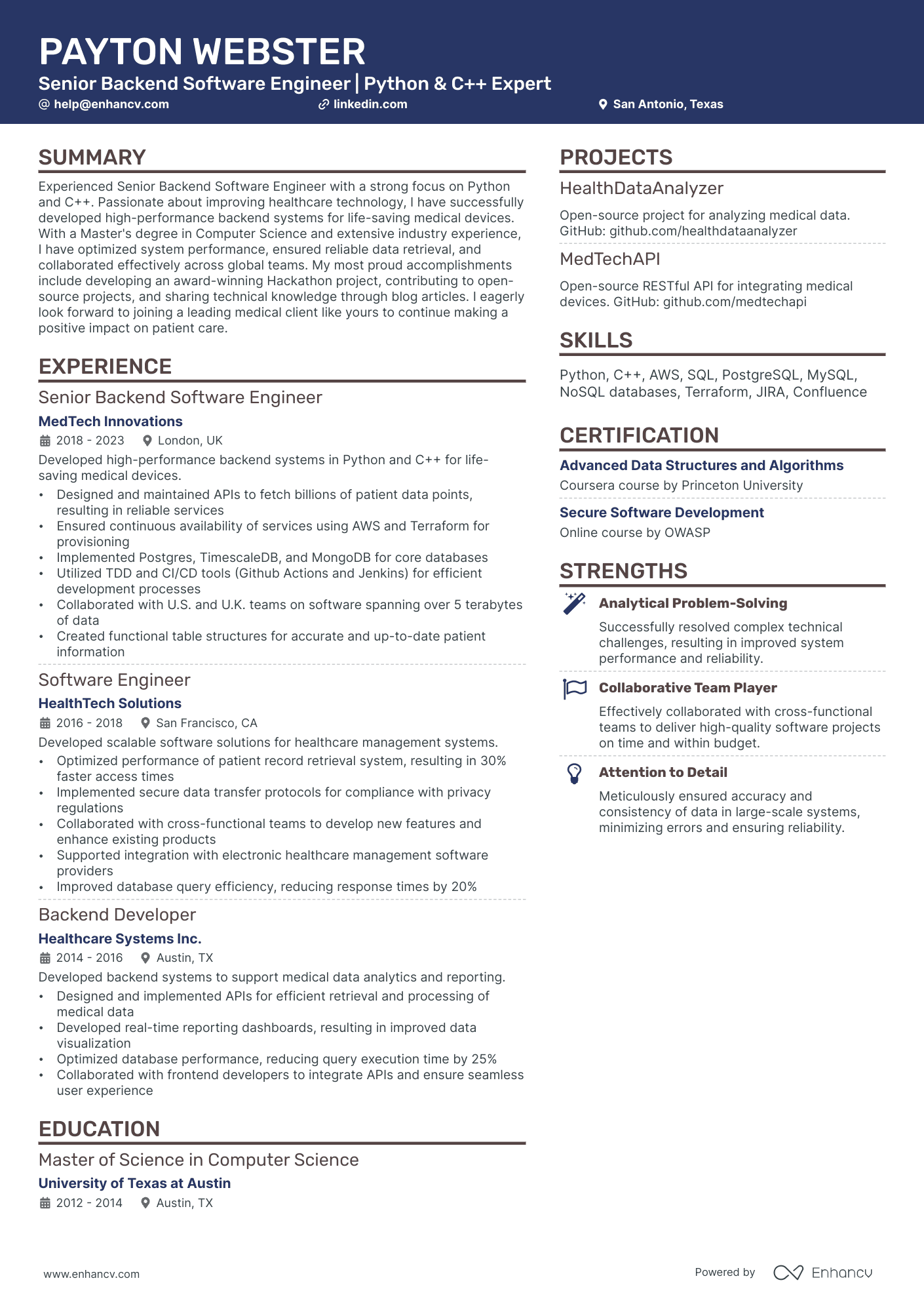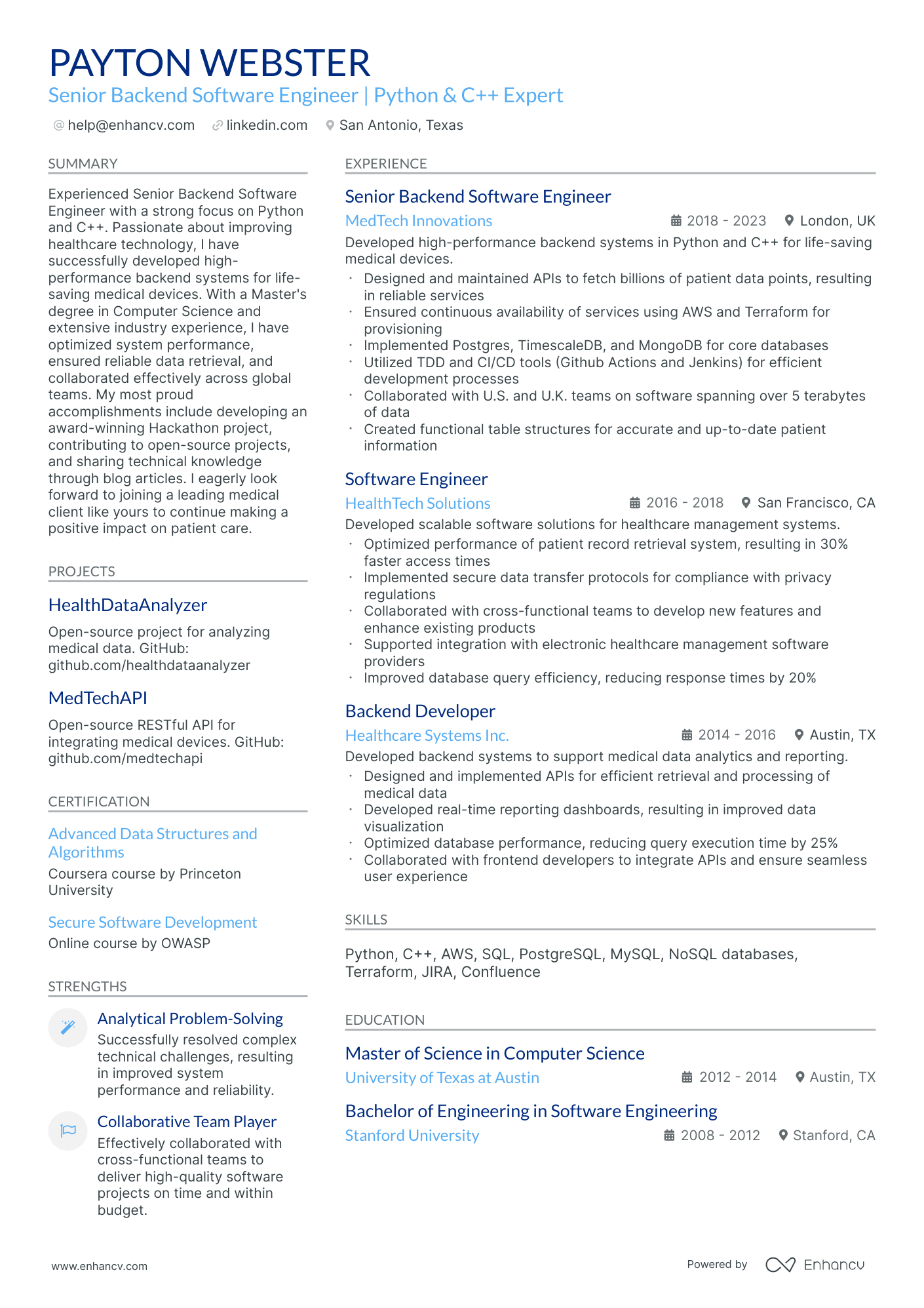A major challenge faced by infrastructure engineers when crafting their resumes is effectively communicating complex technical skills and achievements to non-technical hiring managers. Our guide can assist by providing user-friendly language, industry-specific examples, and quantifiable metrics that can clearly demonstrate these technical competencies and accomplishments to a broad audience.
Dive into our infrastructure engineer resume guide to:
- Explore top-tier resume examples, offering insights into the industry's best practices.
- Enhance sections like experience, education, and achievements with expert advice.
- Articulate your technical prowess and personal attributes, setting you apart from other candidates.
- Sharpen your focus on the distinct skills that make your infrastructure engineer resume resonate with recruiters.
Deciphering the best format for your infrastructure engineer resume
To craft an impactful infrastructure engineer resume, start by thoroughly analyzing the job description.
Your chosen resume format should seamlessly align your experience with the role's requirements.
Consider these four pivotal elements:
- Present your experience effectively. If you boast a wealth of pertinent experience, employ the reverse-chronological resume format, listing roles by date, beginning with the most recent.
- Maintain brevity. Limit your resume to a maximum of two pages, focusing on your most salient attributes.
- Headers serve a purpose. A well-crafted header ensures recruiters can swiftly access your contact details and professional portfolio.
- Opt for PDF. Typically, submit your infrastructure engineer resume in PDF to preserve its layout. However, always adhere to specific job application guidelines.
Be mindful of regional differences in resume formats – a Canadian layout, for instance, might vary.
Upload your resume
Drop your resume here or choose a file. PDF & DOCX only. Max 2MB file size.
Pro tip
Prioritize clarity and organization in your infrastructure engineer resume. Use ample white space, choose readable fonts, and clearly delineate each section.
The five (plus) definite sections your resume for a infrastructure engineer job should include are:
- Header with your headline, contact details, and/or a preview of your work
- Summary (or objective) to pinpoint how your success aligns with the role
- Experience with bullets of your most relevant achievements in the field
- Skills to integrate vital job requirements (both technical and personal)
- Your further dedication to the field, showcased via relevant higher education and/or certifications
What recruiters want to see on your resume:
- Technical Skills: Knowledge and experience with infrastructure frameworks, network protocols, systems administration, cloud platforms (like AWS, Azure, GCP), and tools like Docker, Kubernetes, Terraform etc.
- Problem-Solving Abilities: Demonstrated ability to troubleshoot and resolve infrastructure issues efficiently, reducing downtime and ensuring operational continuity.
- Project Management Experience: Ability to manage and deliver infrastructure projects on time and within budget, using methodologies such as Agile, Scrum, or ITIL.
- Security Knowledge: Understanding of security principles and technologies applicable to infrastructure systems. This includes knowledge of firewalls, VPNs, intrusion detection/prevention systems, and encryption protocols.
- Certifications: Having industry-recognized certifications like Cisco Certified Network Professional (CCNP), Microsoft Certified: Azure Solutions Architect Expert, Google Professional Cloud Architect, Certified Information Systems Security Professional (CISSP), etc.
Recommended reads:
Optimizing your infrastructure engineer resume experience section
Your resume's experience section should resonate with your accomplishments while aligning with the job's demands. Here's how:
- Highlight significant career moments, and back them up with relevant skills.
- Analyze the job description to address both basic and advanced requirements.
- If you have unrelated roles, consider a separate section, but emphasize transferable skills.
- Avoid listing roles from over a decade ago unless they showcase your trajectory, especially for senior roles.
- Illustrate how your contributions enhanced the team or company, linking challenges to solutions.
Review how seasoned infrastructure engineer professionals have crafted their experience sections, emphasizing their contributions.
- Led infrastructure projects at ABC Technologies, resulting in a 20% reduction in server downtime.
- Implemented disaster recovery procedures, ensuring business continuity during critical situations.
- Managed and maintained a large-scale virtualization environment with over 500 VMs.
- Collaborated with cross-functional teams to optimize network performance and improve latency by 30%.
- Automated server provisioning using Ansible, reducing deployment time by 50%.
- Deployed and configured network devices, including routers, switches, and firewalls.
- Managed Active Directory infrastructure for a user base of 500+ employees.
- Performed system upgrades and patch management, ensuring systems were up-to-date and secure.
- Designed and implemented backup solutions, reducing data loss risk by 90%.
- Provided technical support for server and network issues, resolving 80% of incidents within SLA.
- Developed and executed disaster recovery plans, minimizing data loss and ensuring quick recovery.
- Implemented network monitoring tools, improving incident detection time by 40%.
- Managed and optimized cloud infrastructure on AWS, reducing monthly costs by 15%.
- Led the migration of on-premises servers to a hybrid cloud environment, enhancing scalability.
- Collaborated with development teams to deploy CI/CD pipelines for efficient application delivery.
- Designed and implemented a high-availability network architecture, minimizing downtime by 30%.
- Managed server virtualization platforms (VMware), supporting over 200 virtual machines.
- Upgraded storage infrastructure, resulting in a 50% increase in data access speed.
- Implemented security measures, including firewalls and intrusion detection systems.
- Optimized network routing protocols, improving overall network performance by 20%.
- Architecting and deploying cloud infrastructure on Azure, ensuring high availability and scalability.
- Collaborating with DevOps teams to automate infrastructure deployments using Terraform and Ansible.
- Implementing containerization technologies (Docker, Kubernetes) for efficient application management.
- Performing capacity planning and resource optimization to streamline infrastructure usage.
- Leading incident response and troubleshooting efforts to minimize system downtime.
- Managed and maintained data center operations, ensuring 99.9% uptime.
- Deployed and managed virtualization environments using Hyper-V and VMware.
- Collaborated with vendors for equipment procurement, resulting in cost savings of 15%.
- Implemented network segmentation and access controls to enhance security posture.
- Performed regular system audits and implemented necessary patches and updates.
- Designed and implemented scalable infrastructure solutions using Azure cloud services.
- Migrated on-premises servers to AWS, resulting in a 30% reduction in operational costs.
- Developed disaster recovery plans and conducted regular tests for business continuity.
- Managed hybrid cloud environments, integrating on-premises systems with the public cloud.
- Provided technical guidance to junior team members and facilitated knowledge sharing.
- Administered and maintained Windows and Linux servers in a heterogeneous environment.
- Implemented and managed virtualization technologies (VMware, Hyper-V) for resource consolidation.
- Designed and deployed scalable storage solutions, including SAN and NAS.
- Performed regular vulnerability assessments and applied security patches.
- Collaborated with cross-functional teams to troubleshoot complex infrastructure issues.
- Deployed and managed network devices, ensuring optimal routing and connectivity.
- Supported Windows Server infrastructure, including Active Directory and file/print services.
- Executed server hardware upgrades and maintained inventory of IT assets.
- Implemented backup and recovery procedures, minimizing data loss risk.
- Provided technical support to end-users, resolving hardware and software issues.
- Designing and architecting scalable infrastructure solutions using AWS cloud services.
- Implementing infrastructure-as-code (IaC) practices using tools like Terraform and CloudFormation.
- Automating deployment pipelines using Jenkins and GitLab CI/CD for faster application delivery.
- Optimizing cloud costs through resource rightsizing and reserved instances.
- Leading incident response and root cause analysis to improve system reliability.
The following content includes information from "O*NET OnLine" by the U.S. Department of Labor, Employment and Training Administration (USDOL/ETA). Used under the CC BY 4.0 license. The data represents the top responsibilities present on the task lists for infrastructure engineer professionals.
Top Responsibilities for Infrastructure Engineer:
- Consult with users, administrators, and engineers to identify business and technical requirements for proposed system modifications or technology purchases.
- Implement system renovation projects in collaboration with technical staff, engineering consultants, installers, and vendors.
- Keep abreast of changes in industry practices and emerging telecommunications technology by reviewing current literature, talking with colleagues, participating in educational programs, attending meetings or workshops, or participating in professional organizations or conferences.
- Review and evaluate requests from engineers, managers, and technicians for system modifications.
- Assess existing facilities' needs for new or modified telecommunications systems.
- Develop, maintain, or implement telecommunications disaster recovery plans to ensure business continuity.
- Communicate with telecommunications vendors to obtain pricing and technical specifications for available hardware, software, or services.
- Inspect sites to determine physical configuration, such as device locations and conduit pathways.
- Document procedures for hardware and software installation and use.
- Install, or coordinate installation of, new or modified hardware, software, or programming modules of telecommunications systems.
Quantifying impact on your resume
<ul>
Building a infrastructure engineer resume when experience is sparse
If you're light on relevant experience, consider highlighting:
- Short-term roles or internships undertaken during your academic years.
- Contractual roles, emphasizing their relevance and the outcomes achieved.
- Alternative resume formats, such as functional or hybrid, that spotlight your skills.
- Research roles, especially if they involved significant projects or if your contribution was pivotal to the project's success.
Recommended reads:
Pro tip
Remember, the experience section isn't just about traditional roles. It's a space to highlight all professional learning, whether from internships, contract roles, research projects, or other relevant experiences. If it's added value to your skill set for the infrastructure engineer role, it deserves a mention.
Highlighting essential hard and soft skills for your infrastructure engineer resume
Your skill set is a cornerstone of your infrastructure engineer resume.
Recruiters keenly evaluate:
- Your hard skills, gauging your proficiency with specific tools and technologies.
- Your soft skills, assessing your interpersonal abilities and adaptability.
A well-rounded candidate showcases a harmonious blend of both hard and soft skills, especially in a dedicated skills section.
When crafting your infrastructure engineer skills section:
- List up to six skills that resonate with the job requirements and highlight your expertise.
- Feature a soft skill that encapsulates your professional persona, drawing from past feedback or personal reflections.
- Consider organizing your skills into distinct categories, such as "Technical Skills" or "Soft Skills."
- If you possess pivotal industry certifications, spotlight them within this section.
Crafting a comprehensive skills section can be daunting. To assist, we've curated lists of both hard and soft skills to streamline your resume-building process.
Top skills for your infrastructure engineer resume:
Cloud Computing (AWS, Azure, Google Cloud)
Networking (TCP/IP, DNS, VPN)
Infrastructure as Code (Terraform, Ansible)
Containerization (Docker, Kubernetes)
Operating Systems (Linux, Windows Server)
Virtualization (VMware, Hyper-V)
Database Management (SQL, NoSQL)
Monitoring and Logging Tools (Prometheus, ELK Stack)
Scripting Languages (Python, Bash)
Security Best Practices
Problem-Solving
Communication
Team Collaboration
Adaptability
Time Management
Critical Thinking
Attention to Detail
Project Management
Customer Service Orientation
Conflict Resolution
Next, you will find information on the top technologies for infrastructure engineer professonals from "O*NET OnLine" by the U.S. Department of Labor, Employment and Training Administration (USDOL/ETA). Used under the CC BY 4.0 license.
Top technologies for Infrastructure Engineer’s resume:
- Microsoft Windows Server
- Shell script
- Microsoft Project
- Microsoft Teams
- IBM Notes
- Microsoft Outlook
Pro tip
When detailing your skills, align them with the job's requirements. Emphasize unique technical proficiencies and provide examples of your soft skills in action.
Choosing the right certifications and education for your infrastructure engineer resume
Your education section can highlight skills and experiences perfect for the job.
- List college or university degrees with the school name and dates.
- If you're still studying, mention your expected graduation date.
- Think twice before adding unrelated degrees. Space on your resume is precious.
- Discuss educational achievements if they boost your job relevance.
There are many certifications out there. Which ones should you include?
- List your main degree in a separate section with the school name and dates.
- Only add certifications that highlight your skills and experience.
- Place unique or recent certifications near the top.
- Add a brief description to certifications if it helps show your skills.
Remember, it's not about quantity but relevance.
Best certifications to list on your resume
- Cisco Certified Network Associate (CCNA) - Cisco
- AWS Certified Solutions Architect – Associate (SAA-C02) - Amazon Web Services
- Red Hat Certified Engineer (RHCE) - Red Hat
- Certified Information Systems Security Professional (CISSP) - (ISC)²
- CompTIA Network+ - CompTIA
- Certified Information Security Manager (CISM) - ISACA
- ITIL® Foundation - ITIL
Pro tip
Listing your relevant degrees or certificates on your infrastructure engineer resume is a win-win situation. Not only does it hint at your technical capabilities in the industry, but also at a range of soft skills, including perseverance, adaptability, and motivation.
Recommended reads:
best practices for your infrastructure engineer resume summary or objective
How do you know if you should include a resume summary or a resume objective?
- Resume summaries are ideal for infrastructure engineer professionals with more experience, who'd like to give a quick glimpse of their biggest career achievements in the top one-third of their resumes.
- On the other hand, resume objectives serve as a road map to the applicant's aspirations. Candidates use the objective as the North Star of their career (or, how they see themselves in the role in the next few years).
Both could be the perfect fit for your infrastructure engineer resume, depending on your experience.
Here's how candidates for the infrastructure engineer job structure their summaries and objectives.
Resume summary and objective examples for a infrastructure engineer resume
- A seasoned infrastructure engineer with 10+ years of experience. Holding a track record in designing and implementing enterprise-level systems for ABC Corp. Expertise in cloud computing, network architecture, and data center operations. Credited for reducing operational costs by 40% through tailored infrastructure solutions.
- Telecommunications Specialist shifting to infrastructure engineering after gaining valuable insights over a span of 8 years. Demonstrable proficiency in system management, and networking protocols. Successfully led the server migration project at XYZ Ltd., ensuring 99% uptime.
- Amassed significant hands-on experience in 7 years working as a Database Administrator. Now aiming to leverage skills in SQL Server, Python scripting, and Linux administration in an infrastructure engineer role. Notably increased data retrieval speeds by 35% at DEF Company.
- Infrastructure engineer with 5 years under the belt; known for implementing robust security measures at GHI Inc. Proficient in virtualization technologies, disaster recovery solutions, and Cisco systems. Lauded for enhancing network performance by 60% through strategic modifications.
- Driven IT professional seeking an entry into infrastructure engineering. Possessing solid fundamentals in system architecture, network management, and problem-solving. Aiming to apply a strong academic background to contribute towards efficient technical solutions.
- An ambitious Computer Science graduate targeting an infrastructure engineer position. Offering core competencies in cloud computing, hardware troubleshooting, and Python coding. Keen to utilize my potential and foster practical learning in a challenging work environment.
Optimize your resume summary and objective for ATS
Drop your resume here or choose a file.
PDF & DOCX only. Max 2MB file size.
Additional sections to amplify your infrastructure engineer resume
To further personalize your resume and showcase a broader spectrum of your professional journey, consider adding:
- Projects that highlight your hands-on experience.
- Awards that recognize your industry contributions.
- Volunteer work that underscores your community involvement and soft skills.
- Hobbies that offer a glimpse into your personality and passions.
Key takeaways
- Craft a infrastructure engineer resume that's easy to read and aligns with the role's requirements.
- The top third of your resume should clearly convey your unique value proposition for the infrastructure engineer role.
- Tailor your resume to the job, highlighting skills, achievements, and the tangible results of your efforts.
- Detail your certifications and technical skills to demonstrate proficiency with specific tools and technologies.
- The sections you choose should collectively present a comprehensive view of your professional expertise and personality.
